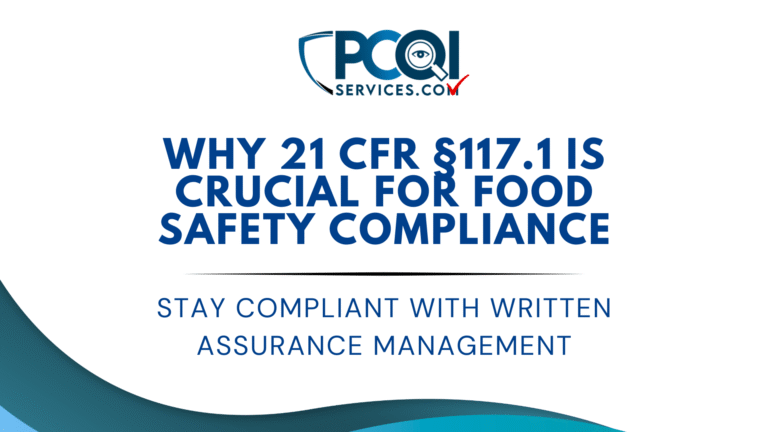Why 21 CFR §117.1 is Crucial for Food Safety Compliance
Understanding the Foundation of FDA’s Food Safety Modernization Act (FSMA)
Food safety is not just a best practice—it’s the law. As the U.S. Food and Drug Administration (FDA) continues enforcing the Food Safety Modernization Act (FSMA), the rule codified in 21 CFR §117.1 plays a pivotal role. This section introduces the framework for Current Good Manufacturing Practice (CGMP) and Hazard Analysis and Risk-Based Preventive Controls (HARPC) for human food.
Ignoring these regulations can lead to severe consequences such as warning letters, product recalls, import alerts, and even facility shutdowns. But understanding and implementing the requirements correctly can ensure smooth operations and long-term regulatory success.
What is 21 CFR §117.1?
21 CFR §117.1 outlines the scope and applicability of the FDA’s food safety regulations for facilities that manufacture, process, pack, or hold human food. It is the gateway section for the entire 21 CFR Part 117 regulation and establishes that covered facilities must comply with:
- • Subpart B – Current Good Manufacturing Practice (CGMP)
- • Subpart C – Hazard Analysis and Risk-Based Preventive Controls
- • Subpart D – Monitoring, Corrective Actions, and Verification
- • Subpart E – Supply-Chain Program
- • Subpart F – Recordkeeping
- • Subpart G – Requirements for a Qualified Individual (PCQI)
Who Must Comply?
Any domestic or foreign facility that handles food for human consumption in the U.S. must comply—unless it qualifies for an exemption (e.g., farms or very small businesses under certain conditions).
Why It Matters
Compliance with 21 CFR §117.1 is not optional for FDA-regulated food businesses. Here’s why it’s critical:
- ✅ Prevents Food Safety Incidents: Establishes proactive systems to detect and prevent contamination and adulteration
- ✅ Reduces Legal and Financial Risk: Helps avoid enforcement actions such as recalls, detentions, and warning letters
- ✅ Strengthens Supply Chain Confidence: Builds trust with retailers, distributors, and consumers
- ✅ Prepares for FDA Inspections: Sets a baseline for audit-readiness and successful FDA interaction
Common Pitfalls
Many businesses fail to comply with 21 CFR §117.1 due to:
- • Lack of a qualified Preventive Controls Qualified Individual (PCQI)
- • Incomplete or outdated hazard analyses
- • Poor documentation and recordkeeping practices
- • Weak supply-chain verification processes
How PCQIServices.com Can Help
At PCQIServices.com, we specialize in regulatory compliance solutions tailored to 21 CFR Part 117. Our Preventive Controls & Adulteration Risk Compliance Program includes:
- ✔ Certified PCQIs to lead hazard analysis and risk control
- ✔ Customized food safety plans aligned with your operations
- ✔ Supplier verification and compliance documentation
- ✔ Ongoing support and training to maintain compliance
Conclusion
If you’re a food facility operator or importer into the U.S., 21 CFR §117.1 is where your compliance journey begins. Don’t wait for an FDA inspection or recall to act. Partner with experts who understand the regulations and can guide you toward full compliance.
Take the first step today. Visit PCQIServices.com and let us help you build a safer, stronger, and audit-ready operation.







